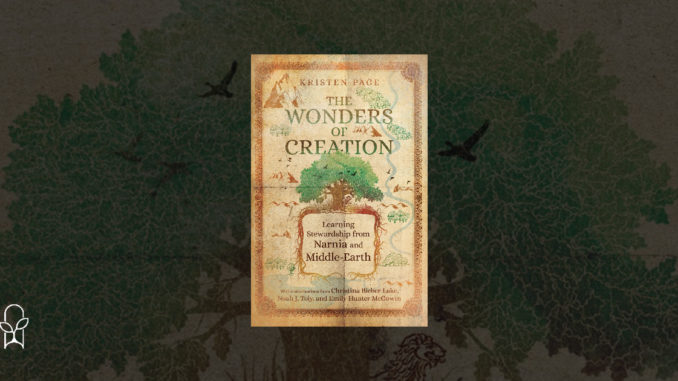
Published by IVP Academic on November 29, 2022
Genres: Academic, Non-Fiction
Buy on Amazon
Goodreads

When an author of fiction employs the imagination and sets characters in a new location, they are in a sense creating a world. Might such fictional worlds give us a deeper appreciation of our own?
Many readers have found themselves, like the Pevensie children, transported by C.S. Lewis into Narnia, and they have traveled from Lantern Waste to Cair Paravel and the edge of the sea. Thanks to J.R. Tolkien, readers have also journeyed with Bilbo, Frodo, and their companions across Middle-earth from the Shire to the Lonely Mountain, the forest of Mirkwood, the mines of Moria, and the very fires of Mount doom. But as often as we enter these fictional worlds as readers, we eventually return to our world refreshed and with sharpened insight.
In The Wonders of Creation, biologist Kristen Page explores the beloved fictional landscapes of Narnia and Middle-earth in order to discover what we might learn about real-life landscapes and how to become better stewards of God's good creation.
I picked up The Wonders of Creation the week after having visited Oxford. After spending the weekend running around to behold all the haunts of Tolkien and Lewis, it felt only natural to retreat with them (and this book) into the nearby woods, sit under a tree, and reflect on what we can learn about stewardship and creation care from Narnia and Middle-Earth.
This book is primarily a collection of three lectures given as part of the Ken and Jean Hansen Lectureship, an annual faculty lecture series at Wheaton. The Wonders of Creation is the sixth lecture to be published by IVP Academic, all of which reflect in some aspect on great English authors. Kristen Page isn’t an English professor or an expert on literature. She’s a biologist who serves as a professor of biology at Wheaton. Using her expertise on creation care, she dives into the worlds of Narnia and Middle-Earth to examine the emphasis that Lewis and Tolkien placed on creation care—something particularly salient as they grew up and lived amid a time of a great technological innovation and great destruction caused by the very same. Taking readers into Narnia and Middle-Earth, Dr. Page explores how a lack of creation care has harmed the world (and ourselves) and calls readers to a more responsible ecological stewardship.
Each lecture is then followed by a reflection from a different individual. Christina Lake, a professor of English, follows up the first lecture, which is about using fiction to guide our own worldview. Noah Toly, a former professor of urban studies, follows up the second lecture, which is a lament at the lack of creation care in our current world. And Emily McGowin, a theologian, responds to the concluding lecture about rejoining a commitment to creation care and coming to love the world the way that God loves the world. The responses are not as substantive as I would have liked, are short, and spend a majority of the time talking about Dr. Page rather than the content of the lecture.
As this is a lecture series, the book’s material does reflect that style. It is very much meant to be something that is listened to or spoken, rather than read. As such, it also carries with it some of the downfalls of spoken language. Page covers her material competently, but not as deeply as I’d like. What would be too complicated or lengthy to explain in a lecture could be explicated in written form. The Wonders of Creation offers an excellent introduction to creation care and Tolkien and Lewis’s ecological views, it could really have gone deeper into their writing to draw out even more themes. As the responses do not really add much, I would recommend listening to the actual lectures rather than perusing the book format. If you’re interested in a volume that does go in-depth into Tolkien’s ecological views, The Science of Middle-Earth is a comprehensive and readable work.
